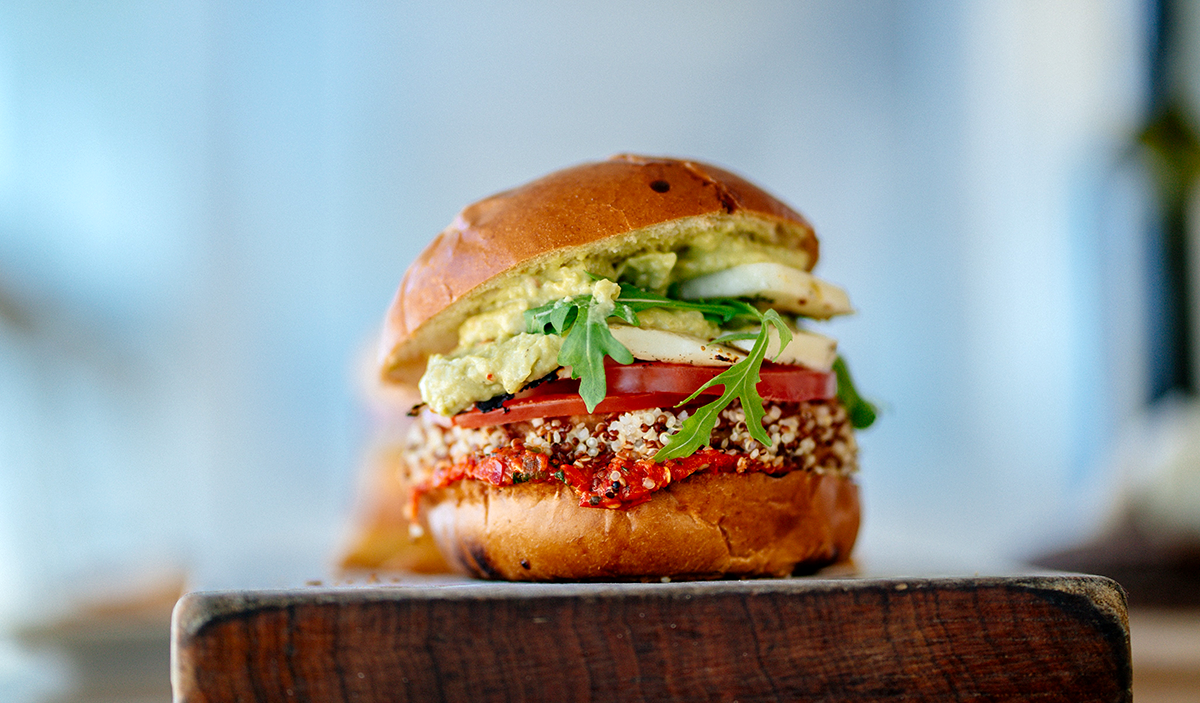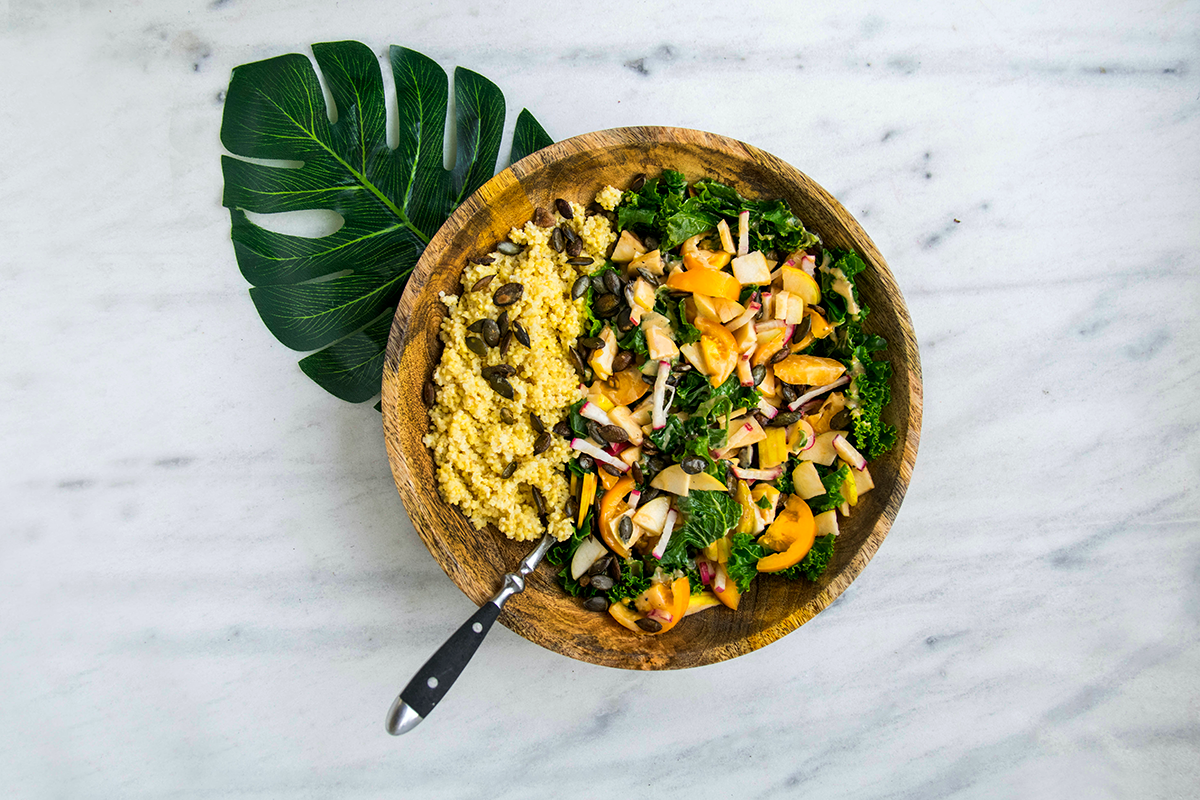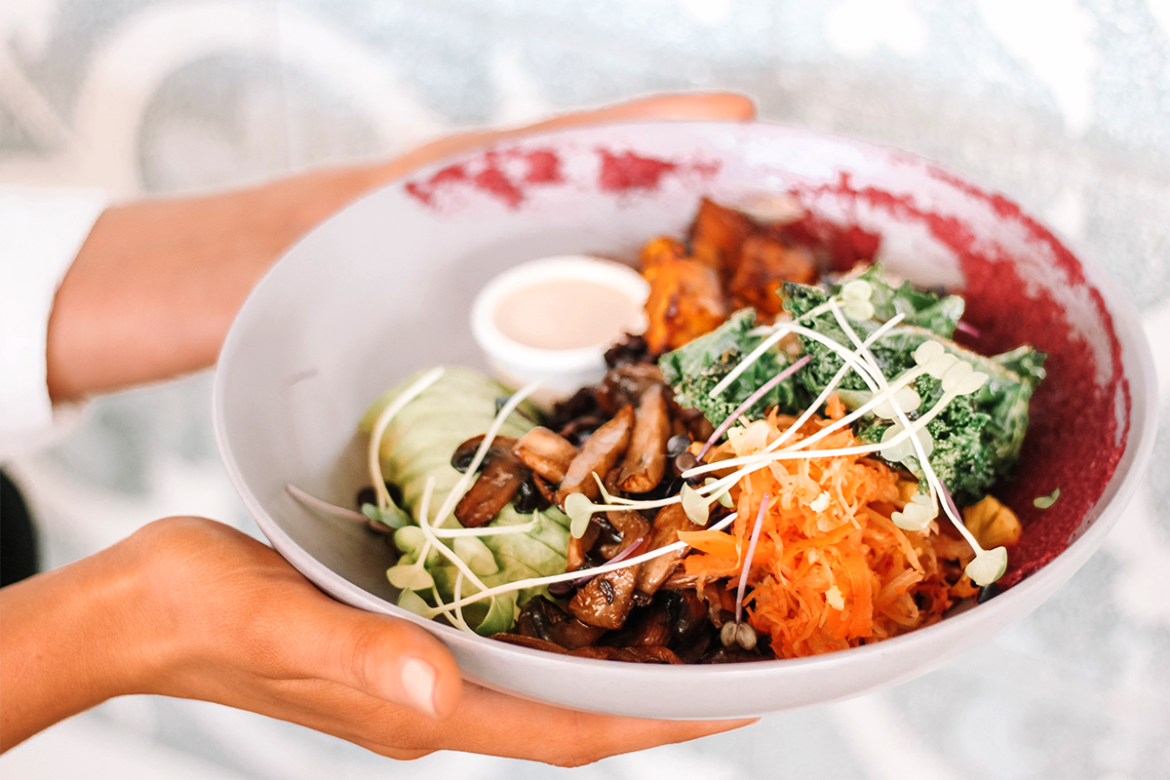Claire Lynch, registered dietitian and Education Lead for Plant Based Health Professionals UK, offers top tips and nutritional advice for those transitioning to a vegan diet.
Are you thinking of ‘going vegan’? Maybe you are not sure where to start. Eating more plants and reducing or excluding animal products is a fantastic decision for our planet, for the animals we share it with, and for your personal health. Whatever the main reason for your decision, the thought of all the changes can be daunting. And although being vegan is not only about diet, that is probably one of the biggest changes that people are concerned about when deciding to follow a vegan lifestyle; especially if your diet was previously a typical Western diet, which relies heavily on animal products and processed foods. So let’s talk about the vegan diet.
But first, let’s just clear up one thing that can cause confusion. Being vegan isn’t necessarily the same as eating a whole food plant-based (WFPB) diet. As already discussed, being vegan isn’t just about food, it is a whole lifestyle that considers other consumer choices we make outside of dietary ones alone. But focusing in on diet:
A vegan diet is defined by the foods it excludes, namely all animal-derived products – including meat, fish, eggs, dairy, and honey. This says nothing about the quality of the food that is included. You can choose to eat a healthy vegan diet, but this is not part of the definition. Thus, ‘less healthy’ plant foods, such as refined carbohydrates and ultra processed foods, are often included in a vegan diet (think oreos, donuts, and fries).
A whole food plant-based diet is defined by the foods it includes – that is, predominantly minimally processed whole plant foods, such as wholegrains, fruits, vegetables, beans, nuts and seeds. For some, this can include a small amount of animal products, but largely the difference is in the quality of the plant foods eaten. At Plant-Based Health Professionals UK (PBHP UK) we advocate for 100% plant-based as the optimal choice. We believe that we do not need animal-based foods, and including them will not bring about any extra health benefits that cannot be derived from plants. Additionally, avoiding them saves any unnecessary animal suffering and is the best choice for planetary health. We also encourage choosing more of the ‘healthy whole’ plant foods than the heavily processed foods. Researchers are now looking at these more subtle dietary differences, and finding that the health benefits derived from a diet rich in high quality plant foods are not found in lower quality plant-based diets; benefits such as lowering the risk of coronary heart disease, COPD, total and disease-specific mortality, total stroke, and type 2 diabetes.
That said, I’m a dietitian and a pragmatist, so I will always advise each person individually according to their beliefs, abilities and circumstances, helping them to move towards their ultimate goals in a realistic manner. My feeling is that we should aim to get as close to the ideal as possible. But remember, don’t let perfection be the enemy of progress. Any changes that you are able to make towards this way of eating is a step in the right direction – towards better health for you, the planet and the animals. But the only changes worth making are the ones that you can maintain long term. So let’s get focused with some practical tips:
- Veganise the dishes you know and love. The most important thing to remember is that realistically, in your normal everyday life, you probably only have a small number of dishes that you cook on a regular basis and rotate between for most of your meals. So don’t feel you are immediately going to have to get to grips with 10s or 100s of new recipes! Have a think about what your favourite meals are. The chances are most of them can be easily ‘veganised’. Spaghetti bolognaise, shepherd’s pie, fajitas, stir fries, curries, pies, ramen, pancakes, gyozas…. all can easily be made or bought vegan. Have a look online for vegan recipes for your favourite dishes.
- Get your loved ones on board. It can be difficult if you live with others that are not wanting to make this change. Talk to them and ask for their support. Your family may be happy to have some plant-based meals with you, and you can adapt other meals so that animal or plant protein sources can be added in at the end (e.g. vegetable stir fry, with tempeh/tofu or chicken/prawns added at the end for different family members). Or include meat/fish/eggs as a ‘side’ and let the vegan meal be the centrepiece. You will find as you cook more and more delicious vegan meals your family members will start enjoying them, and hopefully begin to see the futility of the meat on the side, particularly as you are managing perfectly well without it! My family now eat vegan with me at home, without complaint. But it was a gradual process, so be patient.

- Educate yourself. There are many good resources out there. Use them to find the key information you need about what to eat. PBHP UK has many fact sheets, including Healthy Meal Swaps, The Plant-Based Eatwell Guide and Plant-Based on a Budget. Other websites such as Veganuary and The Vegan Society provide good information and support.
- Search for inspiration. Connect on social media, look for blogs, podcasts, recipe books, YouTube channels and websites to follow. You will pick up practical tips, vegan life hacks, local recommendations, recipes, and products to look out for. There are also free challenges and courses to sign up to, such as PBHP’s 21 Day Plant-Based Health Challenge, that will guide you through your first few weeks.
- Update your store cupboard and fridge. Stock up on plant-based essentials. Try to get to grips with the ingredients you will regularly need and get them onto your shelves. A lot of the books and websites have basic store cupboard lists you can check out – think dried and canned beans and lentils; bags of wholegrains such as rice, bulgar wheat and oats; frozen berries and vegetables; nuts and seeds; herbs and spices. Many of these items can be bought in bulk and will last a long time if stored correctly.
- Planning is the key to success. I always advocate for menu planning and shopping lists with my patients and clients who are trying to make dietary changes. And if that can include some batch-cooking and using up leftovers…all the better. When you are hungry with no plan, no supplies, and no idea what you are going to eat, you are much more likely to end up grabbing something you regret later.
- Don’t let a slip up knock you off course. Whether it’s a disaster in the kitchen cooking up a new recipe, or eating something non-vegan accidentally or due to temptation, reflect on where you went wrong and quickly move on. Don’t beat yourself up.
- Make it easy for yourself in the beginning. Use substitute products such as vegan yoghurt and mayonnaise, plant milks, and plant-based meat and egg alternatives. Some of these you will use long term, some may be useful transitional products which you may find healthier homemade alternatives for in the future. Either way, it is better to be vegan long term, or even 90% vegan, than fail completely after a month or two because you’ve made it too difficult for yourself. Buy in some vegan ready meals and easy snacks for those first weeks as well, whilst you are finding your feet.
- Learn what to look for on labels. There is often a vegan logo on the front of vegan products now. But if not, most animal-derived ingredients on food labels will be in bold type, as they are allergens – milk, egg, fish, crustaceans, molluscs. But there are less obvious ingredients such as beeswax, honey and beef gelatine that aren’t allergens, so knowing what to look for helps. Food without labels, such as whole plant foods, are often the best to stock up on!
- Don’t forget your B12. If you are managing to eat a balanced diet with plenty of those whole foods mentioned above, you should be getting all of the nutrients you need. A further article will follow with a deeper dive into nutrition, but in the meantime, all those following a plant-based diet need to supplement with 25-100µg daily of vitamin B12 (cyanocobalamin). Adults over the age of 50 or with conditions like coeliac disease may need at least 50µg daily. Alternatively, you may choose to take a weekly dose of 2000µg. In addition, we should take a daily supplement of 10µg (400IU) of vitamin D during the winter months (October to March), or all year round if aged >65 years, have very little sun exposure, or are pregnant or breast-feeding.
My key message is to get support, go easy on yourself, and don’t expect perfection from Day 1. This is a journey, and like any other journey you must anticipate some obstacles and detours along the way. Some people will ‘go vegan’ overnight, others will make a gradual change as they learn how to navigate this new environment. Try to remember why you want to make this change and move towards it, step by step.
Wishing you all the best on your plant-based journey!
Check out our website at pbhp.uk for lots of detailed nutritional information, articles, fact sheets and more. And why not consider attending our upcoming conference, VegMed London 2023, taking place at Imperial College on the 9th and 10th of September? It is Europe’s largest medical conference on plant-based nutrition, bringing together top experts in the field of science, health and nutrition. Attendees will gain knowledge and confidence in meeting nutritional requirements for all ages and stages of life, including for the prevention and management of chronic conditions and for achieving optimal athletic performance. It is accessible to health professionals and members of the public alike. For further information on the programme and how to book, please visit the VegMed website here.
 Claire Lynch, RD, MNutr, Dip IBLM/BSLM
Claire Lynch, RD, MNutr, Dip IBLM/BSLM
After starting out as a nurse and then raising her family, Claire undertook a career change and qualified as a dietitian. She has worked within the NHS as a community dietitian and a diabetes specialist dietitian. Claire is also a Board-Certified Lifestyle Medicine Professional. Currently, as a freelance dietitian and Education Lead for Plant Based Health Professionals, Claire’s focus and passion is to seek every opportunity to educate and empower the public and their health professionals with the knowledge and skills needed to begin transforming lives through positive diet and lifestyle changes, and particularly through the power of a whole food plant based diet.




